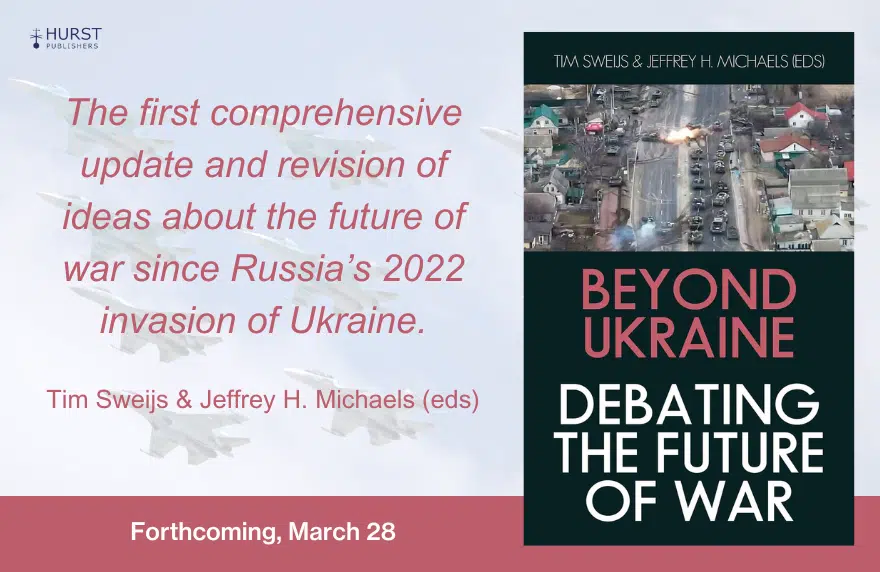How might the Western defence alliance turn Moscow’s war on Ukraine from a major challenge into a basis for renewal?
For three decades after the Cold War, NATO member states no longer faced a major threat, and focussed on out-of-area operations. They took the opportunity to reduce defence spending and foster their own national defence industries; interoperability was limited to air and maritime missions on a small scale.
The 2014 Russian annexation of Crimea and war by proxy in eastern Donbass was a wake-up call, while China’s creeping seizure and fortification of islands in the South China Sea, as well as its relentless acquisition of Western technologies, similarly alerted the Western leadership to a less benign strategic environment. But the real shift occurred in 2022. China and Russia not only announced their ‘unlimited friendship’, but made clear their intention to reduce American hegemony by breaking up the NATO alliance and its Pacific equivalents.
This volume edited by Janne Haaland Matlary and Rob Johnson is the first account of the challenges and solutions for so-called strategic integration in this coercive global situation. The contributors show, thematically and through selected national case-studies, how strategic integration and interoperability are conceived, debated, problematised and resolved. The chapters are written with specific reference to the illegal Russian invasion of Ukraine, which has galvanised a new era of integration and alliance cooperation within NATO.
HCSS Director of Research Tim Sweijs and Assistant Analyst Tara de Klerk contributed the chapter “The NATO 2022 Strategic Concept: Guiding, Aligning, Binding?“. Sweijs and De Klerk remind readers that NATO has returned to a state of ‘persistent confrontation’ that is likely to endure at least for the coming decade. The resurgence of Russia traces a historical pattern of rivalries between opposing power blocs that exhibit ‘momentum shifts, unexpected twists, and outright reversals of fortune’, and tend to be hard to eradicate. This pattern follows from the Punic Wars between Rome and Carthago, the One Hundred Years War between France and England, up to the rise of Nazi Germany following the crushing defeat of Wilhelm Germany and continued contestation with other major powers over the dominance of Europe. Russia’s militarism and attempt to re-establish a position of power following a period of decline continues this historical pattern. The authors examine the role of Strategic Concepts in NATO’s history, offer an Assessment Framework to evaluate the utility of such concepts, and using the framework, assess how the current Strategic Concept can help NATO navigate the challenges it faces today.
Featuring a foreword by General Sir James Everard, “NATO and the Russian war in Ukraine” includes contributions by renowned experts such as Steinar Torset, Amund Lundesgaard, Beatrice Heuser, Andrew A. Michta, Kori Schake, Robin Allers, Håkon Lunde Saxi, Tuomas Iso-Markku and Matti Pesu.
“NATO and the Russian War in Ukraine: Strategic Integration and Military Interoperability” is available from March 21 from Hurst Publishers, Amazon, Oxford University Press and other major book retailers.
‘A global geopolitical scene at once febrile, fragile and fraught with danger demands a work of profound strategic substance and significance: this publication is right on cue. This wonderfully crafted book bristles with resonating and incisive insights, and underscores the status of the editors as doyens of contemporary strategic commentary. I commend it unreservedly and with great enthusiasm.’ — David Ellery, Professor, Honorary Fellow and Trustee, Durham University
‘The Russo-Ukrainian War provided NATO with its most demanding test for decades. This thorough analysis of the alliance’s response shows how this test was passed, at least during the war’s first stage. But it also shows how the conflict led member states to reappraise established practice and explore how they could achieve deeper defence integration.’ — Sir Lawrence Freedman, Emeritus Professor of War Studies, King’s College London
‘A necessary and thought-provoking book that deserves a wide readership.’ — Sten Rynning, Professor of War Studies and Director, Danish Institute for Advanced Study, University of Southern Denmark
‘This excellent and authoritative volume exploring the galvanising effect of Russia’s brazen invasion of Ukraine on efforts to deepen NATO integration could not be more timely.’ — Mats Berdal, Professor of Security and Development, King’s College London
‘First-rate scholars and analysts highlight that increased defence integration and interoperability are key to NATO’s efforts to address the challenges created by the Russian invasion of Ukraine and the US’s continuing pivot to Asia.’ — Peter Viggo Jakobsen, Associate Professor, Royal Danish Defence College
About the Authors
Janne Haaland Matlary is Professor of International Politics at the University of Oslo and the Norwegian Military Command and Staff College; she was formerly Norway’s deputy minister of foreign affairs. Rob Johnson is Director of the Changing Character of War Centre at the University of Oxford.







